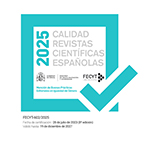Contradicciones y veleidades en el debate parlamentario sobre la Televisión pública en España (1990-2010)
Resumen
La llegada de la televisión privada a España a partir de 1990 sumió a la televisión pública en una doble crisis: financiera, debido a la pérdida de ingresos por publicidad, y de función, pues no se había planteado qué significaba ser una televisión de servicio público. Este artículo analiza el debate político en la Comisión de Control de RTVE en el Parlamento entre 1990 y 2010, fecha de entrada en vigor de la ley que definió un nuevo modelo de TVE, sin publicidad y con una definición clara de servicio público. La falta de voluntad política por parte de los sucesivos gobiernos para hacer cambios reales y una oposición más interesada en erosionar al gobierno de turno que en dirimir los grandes debates de fondo sobre el modelo televisión pública hicieron que los cambios llegaran forzados por circunstancias exteriores, como la normativa europea o la crisis del mercado publicitario.
Descargas
Descarga artículo
Licencia
La revista Estudios sobre el Mensaje Periodístico, para fomentar el intercambio global del conocimiento, facilita el acceso sin restricciones a sus contenidos desde el momento de su publicación en la presente edición electrónica, y por eso es una revista de acceso abierto. Los originales publicados en esta revista son propiedad de la Universidad Complutense de Madrid y es obligatorio citar su procedencia en cualquier reproducción total o parcial. Todos los contenidos se distribuyen bajo una licencia de uso y distribución Creative Commons Reconocimiento 4.0 (CC BY 4.0). Esta circunstancia ha de hacerse constar expresamente de esta forma cuando sea necesario. Puede consultar la versión informativa y el texto legal de la licencia.










